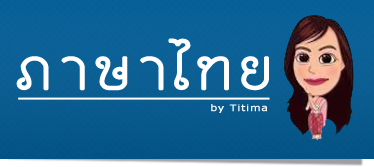Eating out
Nowadays, eating out is very common. There are a lot more restaurants now than in the past. Thai people usually order food and rice to eat together, which is different from the westerns; they usually order 1 dish of food for 1 person.
When we walk into a restaurant, we usually hear waiters or waitresses ask “gèe têe khá/khráb”(กี่ที่คะ/ครับ) (How many people?) in this question meaning the number of people. It we have 3 people, we answer “sǎam têe khà/khráb” (สามที่ค่ะ/ครับ)
The usage of Thai cultural language when eating out is that after we finish eating, we have to tell a waiter/waitress to check the bill. In Thai cultural language, we use a little bit different expressions.
If we go the a small restaurant such as a food stall on sidewalks we say “gèb nge̅un dûay” (เก็บเงินด้วย) or “khίd nge̅un dûay” (คิดเงินด้วย)
But if we go to an expensive restaurant, we say “chécg bi̅n dûay” (เช็คบิลด้วย)
When Thai people order the food, they will use the word “khǎw” (ขอ) (give me) instead of using the word “séu” (ซื้อ) (buy)
For example
“khǎw khâao-pàd ja̅an ne̅ung”
“ขอข้าวผัดจานนึง”
Can you give me fried rice?
การรับประทานอาหารนอกบ้าน
ในยุคสมัยปจจุบัน การรับประทานอาหารนอกบ้านได้รับความนิยมมากขึ้น ดังจะเห็นได้จากจํานวนร้านอาหารที่มีมากมายกว่าสมัยก่อน การสั่งอาหารมาทานนั้น คนไทยนิยมสั่งอาหารเป็นกับข้าว แล้วสั่งข้าวเปล่า เพื่อทานอาหารต่างๆร่วมกัน ซึ่งจะแตกต่างจากวัฒนธรรมตะวันตกที่มักสั่งอาหารเพียง 1 อย่างสําหรับทานเพียงคนเดียว เมื่อเราไปถึงร้านอาหาร มักได้ยินพนักงานต้อนรับถามคําถามว่า
“กี่ที่คะ/ครับ”
คําว่า “ที่” ในที่นี่หมายถึง จํานวนคน หากเราไปกัน 3 คน ก็มักตอบว่า 3 ที่ค่ะ/ครับ
นอกจากนี้ ในด้านของวัฒนธรรมการใช้ภาษา เรื่อง การรับประทานอาหารนอกบ้านนั้น เมื่อเรารับประทานอาหารเสร็จแล้ว และต้องการแจ้งให้พนักงานคิดเงินนั้น วัฒนธรรมการใช้ภาษาไทย ใช้สํานวนในการพูดแตกต่างกันอยู่เล็กน้อย คือ หากร้านอาหารที่ไปทานนั้นเป็นร้านอาหารเล็กๆเช่น ร้านอาหารบนทางเท้า เรามักพูดว่า “เก็บเงินด้วย” หรือ “คิดเงินด้วย” แต่หากเป็นร้านอาหารที่มีราคาแพงขึ้นไป เช่น ร้านอาหารภายในศูนย์การค้า เรามักพูดว่า “เช็คบิลด้วย”เวลาสั่งอาหาร คนไทยจะใช้คําว่า “ขอ” แทนการใช้คําว่า “ซื้อ”
เช่น “ขอข้าวผัดจานนึง”
